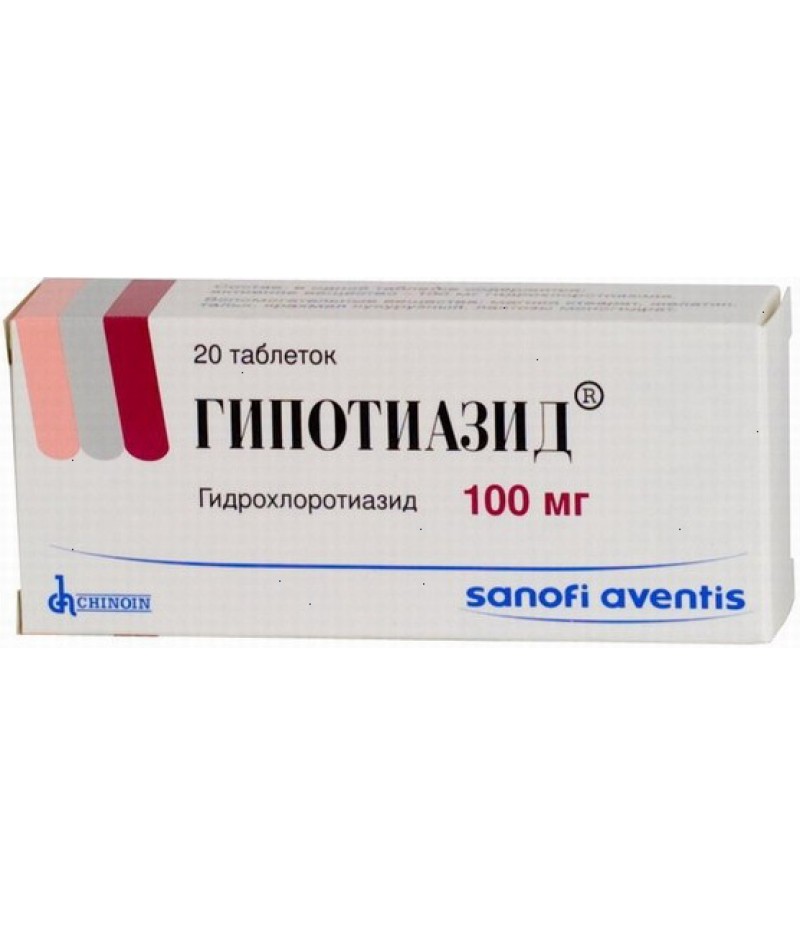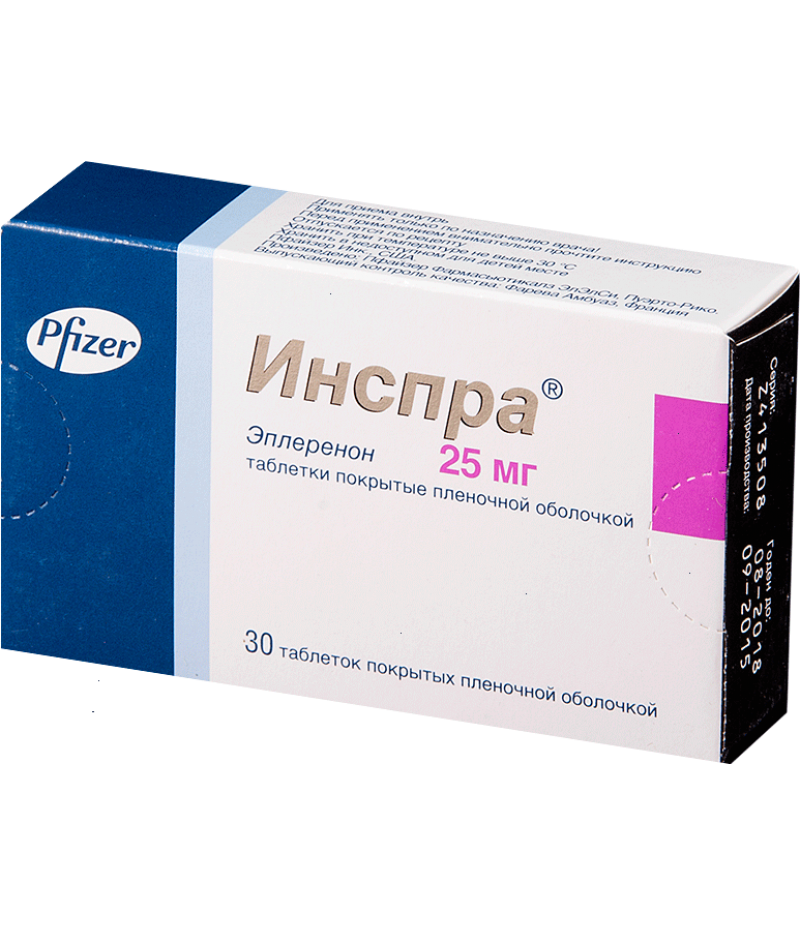Hypothiazid tabs 100mg #20
- $7.51
- 3 or more $7.39
- Availability:In Stock
User manual for HypothiazidReed more and buy Hypothiazid tablets hereCompositionThe tablet contains the main component of hydrochlorothiazide in an amount of 25/100 mg and additional substances in the form of gelatin, talc, magnes..
Tags: tabs
User manual for Hypothiazid
Reed more and buy Hypothiazid tablets here
Composition
The tablet contains the main component of hydrochlorothiazide in an amount of 25/100 mg and additional substances in the form of gelatin, talc, magnesium stearate, corn starch and lactose monohydrate.
Form of issue
Hydrochlorothiazide tablets are round in shape, flat, white in color. On one side is engraved the letter "H", on the other side is the dividing risk. Tablets are compactly packed in special blisters of 20 pieces. In the pack there is 1 blister, in addition an instruction from the manufacturer is attached with a detailed description of all sections.
pharmachologic effect
Diuretic agent. The principle of the action of thiazide diuretics is based on the enhancement of diuresis through the suppression of the reabsorption of Na and Cl ions in the initial sections of the tubules of the renal system, which causes an increased excretion of Na, Cl, and water ions. Simultaneously, the excretion of electrolytes (Mg, K, etc.) increases.
The maximum therapeutic doses of thiazide duretics give approximately the same natriuretic / diuretic effect. Diuresis and natriuresis are recorded after 2 hours, and the maximum effect is manifested after 4 hours. Thiazide diuretics are able to suppress the activity of carbonic anhydrase due to the increased excretion of bicarbonate ions. This effect is weak and has almost no effect on the pH of urine. Hydrochlorothiazide is characterized by hypotensive effect. The active substance has no effect on normal blood pressure.
Pharmacodynamics and pharmacokinetics
Suction, distribution
The active substance, although not complete, but very quickly absorbed from the gastrointestinal tract (the effect persists for 6-12 hours). The maximum concentration is recorded after 1.5-2.5 hours with the intake of 100 mg of the active ingredient. When the concentration of hydrochlorothiazide in the blood plasma is 2 μg / ml, the most pronounced diuretic effect is observed (4 hours after taking the tablet). The protein binding rate is 40%. Active ingredient Hydrochlorothiazide is able to penetrate into breast milk and can easily pass the placental barrier.
Excretion
Unchanged, the active substance is excreted by the renal system through filtration and secretion. The index T1 \ 2 with a normally functioning renal system is 6.4 h.
Pharmacokinetics of a special category of patients
With QC less than 30 ml per minute T1 / 2 (half-life) is 20.7 hours. With a moderate pathology of the renal system, this indicator is 11.5 hours.
Indications for use of Hypothiazid
From what tablets Hypothiazid? The medication is prescribed for an edematous syndrome of different genesis:
portal hypertension;
chronic renal failure;
nephrotic syndrome;
reception of corticosteroids;
acute glomeruloneritis;
premenstrual tension syndrome;
chronic course of heart failure.
Indications for use Hypothiazid:
control in polyuria (with diabetes insipidus, with nephrogenic diabetes);
arterial hypertension (in combination with other antihypertensive drugs, in monotherapy);
prevention of stone formation in the urinary system in predisposing patients (reduced risk of hypercalciuria).
Contraindications
The main contraindications for the administration of hydrochlorothiazide:
Addison's disease;
severe hepatic failure;
anuria;
severe renal failure;
difficultly controlled diabetes mellitus;
individual hypersensitivity;
restriction on age - up to three years (actual for a solid dosage form);
refractory hyponatremia (decreased level of NA), hypokalemia, hypercalcemia;
intolerance to sulfonamides.
Relative contraindications:
lactose intolerance;
hypokalemia;
reception of cardiac glycosides (eg, Digoxin);
gout;
cirrhotic lesion of the hepatic system;
IHD;
hypercalcemia;
hyponatremia;
elderly age.
Side effects
Metabolism:
hyponatremia;
hypercalcemia;
hypokalemia;
hypochloraemic alkalosis;
glucosuria;
hyperglycemia;
hyperuricemia;
hypomagnesemia.
Hypotnatremia is manifested by muscle cramps, fast fatigue, convulsions, confusion, excessive excitability, lethargy. With hypochloraemic alkalosis, nausea, weakness, emetic pangs, pain and muscle cramps, various variants of heart rhythm disturbance, thirst, dry mouth, changes in the psyche and mood are noted. On the background of hypochloremic alkalosis, hepatic encephalopathy may develop (up to the hepatic coma). Reducing sugar tolerance can cause an exacerbation, a manifestation of the latent form of diabetes mellitus, which is manifested in biochemical analysis of hyperglycemia.
The digestive tract:
constipation;
anorexia;
cholestatic jaundice;
cholecystitis;
diarrheal syndrome;
pancreatitis;
sialadenitis.
The cardiovascular system:
arrhythmia;
vasculitis;
orthostatic hypotension.
Peripheral nervous system, CNS:
headache;
temporal fuzziness of visual perception;
dizziness;
paresthesia.
Allergic Answers:
respiratory distress syndrome (edema of light non-cardiogenic genesis, pneumonitis).
Other negative reactions:
development of interstitial nephritis;
changes in the functioning of the renal system;
violation of potency.
Tablets Hypothiazid, instructions for use (Method and dosage)
The medicine is intended for reception per os. Selection of the dose is carried out on an individual basis. Determination of the minimum effective dosage is carried out with constant medical supervision. The increased loss of Mg and K ions during the intake of hydrochlorothiazide requires ion replacement.
Instructions for use of adults with Hypothiazid for lowering blood pressure
Therapy starts with a minimum dosage of 25-50 mg once a day. It is allowed as a combination with other antihypertensive drugs, and monotherapy. Some patients have 12.5 mg of Hypothiazid. The hypotensive effect is manifested after 3-4 days, but the optimal therapeutic effect is recorded only after 3-4 weeks. At the end of therapy, the hypotensive effect of the medication is maintained for a week.
Stopping swelling
Therapy of edeminal syndrome begins with the admission of 25-100 mg of Hypothiazid (allowed once in 2 days). In severe cases, taking 200 mg per day is required. When premenstrual syndrome appoint 25 mg per day from the onset of negative symptoms and until menstruation.
In the nephrogenic form of diabetes insipidus, 50-150 mg of medication per day is prescribed per several doses.
Children are given a dose by weight. The average pediatric dosages are 1-2 mg / kg or 30-60 mg / m2 of the baby's body surface area (for 1 intake). The daily dose for children 3-12 years is 37.5-100 mg.
Overdose
The clinical picture of overdose is manifested due to a sharp loss of electrolytes and fluid, which is manifested by the following symptoms:
paresthesia;
dizziness;
a drop in blood pressure;
spasms in the calf muscles;
hypokalemia;
alkalosis;
hypochloremia;
confusion of consciousness;
pronounced weakness, apathy;
tachycardia;
oliguria;
an increase in the concentration of urea nitrogen (more pronounced in patients with renal system pathology);
hyponatremia;
anuria (as a result of hemoconcentration);
polyuria;
nausea;
shock;
vomiting.
It is recommended to call artificial vomiting, gastric lavage, the appointment of Activated Carbon or other drugs with an enterosorbent effect. In case of shock and drop in blood pressure, measures are taken to recover the volume of circulating blood and electrolytes (Na, K). Control over the indicators of the state of water-electrolyte balance is mandatory (special attention is paid to the level of potassium in the blood), over the work of the renal system (before normalization of all indices). Specific antidote is not developed.
Interaction
Taking hypotensive medications may require correction of the dosage regimen of Hypothiazid, tk. drugs can potentiate the action of each other. The increase in lithium toxicity and the reduction of renal clearance in the treatment of lithium salts were recorded. Hypomagnesemia and hypokalemia arising from the use of diuretics can increase the toxic effect of digitalis, which must be taken into account when taking Digoxin and other cardiac glycosides. The risk of arrhythmia, associated hypokalemia, increases significantly with Amiodarone. It registers hyperglycemia and a decrease in the effectiveness of oral forms of hypoglycemic medication when taking Hypothiazid. The excretion of potassium is enhanced by the intake of corticosteroid drugs. Preparations of the NSAID group can reduce the effectiveness of diuretics and suppress the hypotensive effect of thiazides. It is possible to enhance the effectiveness of muscle relaxants (nondepolarizing forms). Hypotensive orthostatic effect is greatly enhanced by the use of barbiturates, ethanol, opioid analgesics. Kolestiramin is able to reduce the absorption index of Hypothiazid. The risk of toxic effects of amantadine increases, because Hydrochlorothiazide reduces its clearance, increasing the concentration of Amantadine in blood plasma. It is necessary to temporarily discontinue the thiazide diuretic before carrying out tests that characterize the functional state of the parathyroid glands.
Terms of sale
You don't need a prescription to buy Hypothiazid.
Storage conditions
Tablets remain effective when stored in the original packaging at temperatures up to 25 degrees. Direct sunlight adversely affects the effectiveness of the medicament and significantly reduces the shelf life specified by the manufacturer.
Shelf life - 60 months.
special instructions
Long-term, long-term diuretic therapy requires regular monitoring of indicators characterizing the state of water-electrolyte equilibrium. Patients with the following pathologies are at risk:
diseases of the cardiovascular system;
disorders in the operation of the hepatic system;
changes in water-electrolyte balance (muscle weakness, dry mouth, muscle pain, lethargy, thirst, oliguria, hypotension, tachycardia, convulsions, anxiety, drowsiness, digestive disorders).
Avoid hypokalemia is possible with the intake of special potassium-sparing medicines and diet with the use of food rich in potassium (vegetables, fruits). Often recorded increased magnesium excretion by the renal system when treated with thiazide diuretics. The pathology of the renal system requires mandatory control over the creatinine clearance. In predisposed patients, a cumulative effect can be observed and azotemia develop. When oliguria is considered a variant with the abolition of Hypothiazid.
With the pathology of the liver system, the thiazide diuretic is administered with caution. even minor fluctuations in the water-electrolyte balance can affect the level of ammonium in the blood and provoke the hepatic coma. Hypothiazid can cause increased bilirubin in the blood. With severe coronary and cerebral sclerosis, a more attentive attitude to the patient's condition is required.
The use of thiazide drugs has an effect on the tolerance of glucose. With latent and manifest forms of diabetes mellitus, long-term therapy with a diuretic may require control over the metabolism of carbohydrates, which is explained by the need to adjust dosages of hypoglycemic drugs. Patients suffering from impaired uric acid metabolism require special observation. Rarely in the background of long-term administration of the diuretic of Hypothiazid, changes in parathyroid glands are registered, which is accompanied by hypophosphatemia and hypercalcemia. Thiazide forms of diuretics can reduce the level of an element of iodine, which is able to bind to proteins in the serum without affecting the functioning of the thyroid gland. In patients with glucose intolerance, complaints about the functioning of the digestive tract are often recorded. The medication affects the ability to drive a vehicle and perform various types of work that may require the patient's increased attention.
Hypothiazid during pregnancy (and lactation)
Active ingredient hydrochlorothiazide is contraindicated in pregnancy in the first trimester. It is permissible to prescribe medication in the 2nd and 3rd trimesters if the possible benefit to the mother is significantly greater than the expected risk to the health of the fetus. The active substance can pass the placental barrier. Newborns may develop thrombocytopenia, jaundice and other consequences. The active ingredient is secreted by lactation, which may require the interruption of breastfeeding when a diuretic is needed.
Reviews about Hypothiazid
The medication is often prescribed for diseases of the heart and vascular system, accompanied by edematous syndrome. Patients report a mild diuretic effect of the drug while observing the dosages indicated by the doctor. Edema syndrome is stopped gradually, without washing out the necessary micronutrients from the body.
Reviews about Hypothiazid when losing weight ambiguous. Weight actually decreases, but only at the expense of lost fluid. Kilograms are returned after water enters the body. The medication has no effect on fat and muscle tissue, therefore, the use of Hypothiazid for weight loss is impractical, and in some cases can damage health (loss of trace elements, dehydration, etc.)


